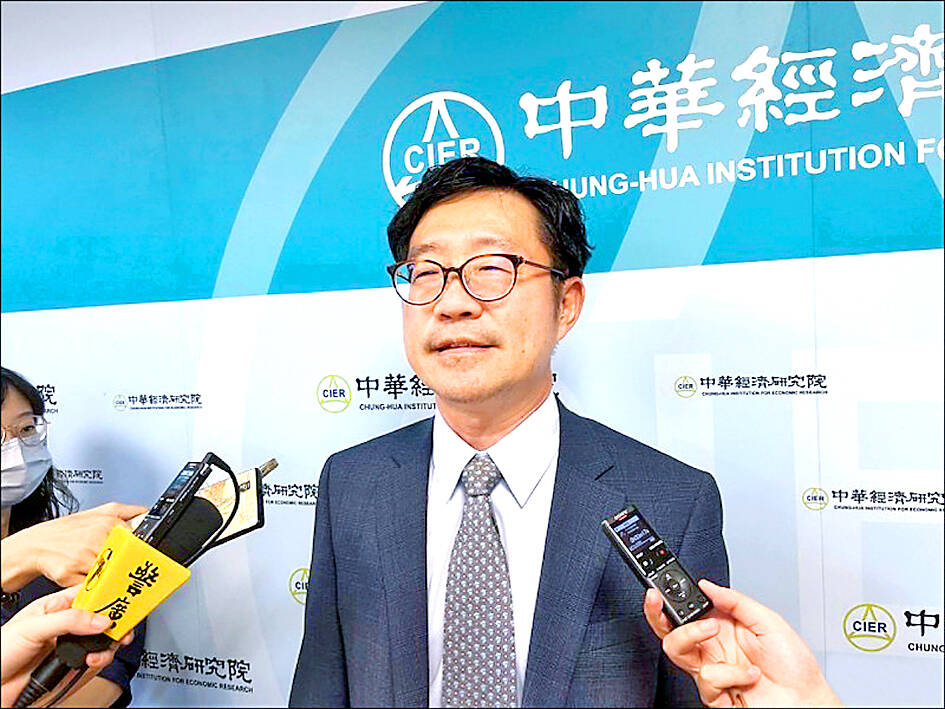The Chung-Hua Institution for Economic Research (CIER, 中華經濟研究院) yesterday sharply raised its forecast for Taiwan’s economic growth this year to 5.45 percent, citing sustained global demand for semiconductors and artificial intelligence (AI)-related technologies.
The upgrade from 3.05 percent in July underscores stronger-than-expected growth momentum, despite global uncertainties and rising US-China trade friction.
“Taiwan’s economic showing has turned out better than most research bodies expected,” CIER president Lien Hsien-ming (連賢明) told a news conference in Taipei.

Photo: Hsu Tzu-ling, Taipei Times
The outperformance reflects Taiwan’s dominant role in advanced semiconductor manufacturing and the global buildout of AI infrastructure, he said.
Lien linked the brighter outlook to Taiwan Semiconductor Manufacturing Co (TSMC, 台積電), whose earnings guidance on Thursday boosted market optimism.
The world’s largest contract chipmaker raised its annual revenue growth forecast to 35 percent from 30 percent, driven by surging demand for leading-edge chips used in AI applications.
Other local companies in the AI supply chain have also posted strong results this year, even as traditional industries continue to face headwinds due to weak global consumption.
CIER expects third-quarter GDP growth to reach 5.82 percent before moderating to 2.71 percent in the fourth quarter, consistent with the usual slowdown among upstream technology suppliers.
CIER researcher Peng Su-ling (彭素玲), citing S&P Global Market Intelligence data, said that Taiwan’s expansion stands out globally, with projected growth outpacing the global average of 2.69 percent and South Korea’s 0.91 percent.
Taiwan’s growth this year reflects a balanced mix of domestic and external demand, Peng added.
Domestic demand is expected to contribute 2.5 percentage points to overall GDP, supported mainly by a 10.55 percent increase in private investment tied to AI-related capacity expansion, Peng said.
Exports are forecast to add another 2.95 percentage points, rebounding from last year’s drag, Peng added.
CIER expects consumer prices to rise 1.81 percent this year, with inflationary pressures easing in the second half as the New Taiwan dollar’s appreciation helps offset import costs.
However, households could continue to feel the pinch from rising rent, food prices and service charges, Peng said.
The think tank said its forecast does not account for renewed trade tensions between Washington and Beijing.
The US has threatened to impose tariffs of up to 100 percent on Chinese goods after Beijing tightened controls on rare earth exports.
Lien said the direct impact on Taiwan should remain limited, as the local semiconductor industry is not a major consumer of rare earth materials.

MAKING WAVES: China’s maritime militia could become a nontraditional threat in war, clogging up shipping lanes to prevent US or Japanese intervention, a report said About 1,900 Chinese ships flying flags of convenience and fishing vessels that participated in China’s military exercises around Taiwan last month and in January have been listed for monitoring, Coast Guard Administration (CGA) Deputy Director-General Hsieh Ching-chin (謝慶欽) said yesterday. Following amendments to the Commercial Port Act (商港法) and the Law of Ships (船舶法) last month, the CGA can designate possible berthing areas or deny ports of call for vessels suspected of loitering around areas where undersea cables can be accessed, Oceans Affairs Council Minister Kuan Bi-ling (管碧玲) said. The list of suspected ships, originally 300, had risen to about 1,900 as

Japan’s strategic alliance with the US would collapse if Tokyo were to turn away from a conflict in Taiwan, Japanese Prime Minister Sanae Takaichi said yesterday, but distanced herself from previous comments that suggested a possible military response in such an event. Takaichi expressed her latest views on a nationally broadcast TV program late on Monday, where an opposition party leader criticized her for igniting tensions with China with the earlier remarks. Ties between Japan and China have sunk to the worst level in years after Takaichi said in November that a hypothetical Chinese attack on Taiwan could bring about a Japanese

MORE RESPONSIBILITY: Draftees would be expected to fight alongside professional soldiers, likely requiring the transformation of some training brigades into combat units The armed forces are to start incorporating new conscripts into combined arms brigades this year to enhance combat readiness, the Executive Yuan’s latest policy report said. The new policy would affect Taiwanese men entering the military for their compulsory service, which was extended to one year under reforms by then-president Tsai Ing-wen (蔡英文) in 2022. The conscripts would be trained to operate machine guns, uncrewed aerial vehicles, anti-tank guided missile launchers and Stinger air defense systems, the report said, adding that the basic training would be lengthened to eight weeks. After basic training, conscripts would be sorted into infantry battalions that would take

DEEP-STRIKE CAPABILITY: The scenario simulated a PLA drill that turned into an assault on Taiwan’s critical infrastructure, with the launchers providing fire support Taiwan yesterday conducted this year’s first military exercises at Longsiang Base in Taichung, demonstrating the newly acquired High Mobility Artillery Rocket System’s (HIMARS) ability to provide fire support and deep-strike capabilities. The scenario simulated an attack on Penghu County, with HIMARS trucks immediately rolling into designated launch areas and firing barrages at the Wangan (望安) and Cimei (七美) islands, simulating the provision of fire support against invading forces. The HIMARS are supposed to “fire and leave,” which would significantly increase personnel and equipment survivability, a military official said. The drill simulated an exercise launched by the Chinese People’s Liberation Army (PLA) Eastern